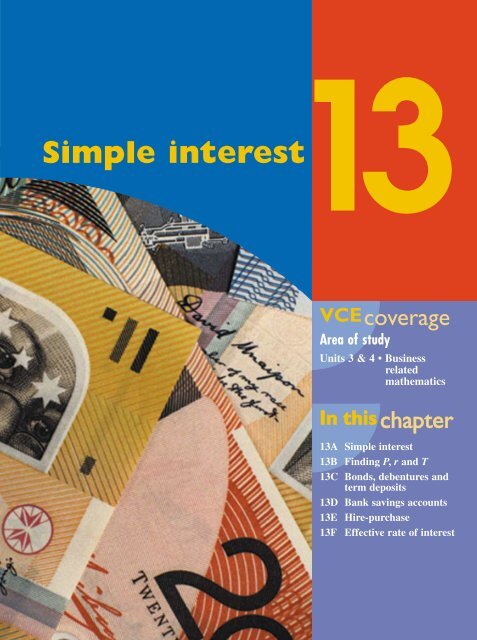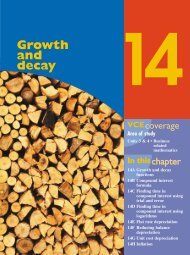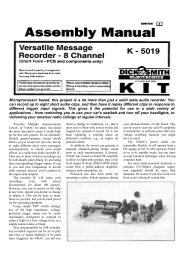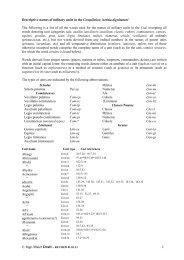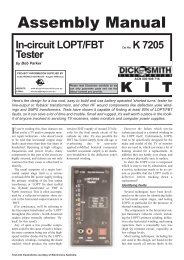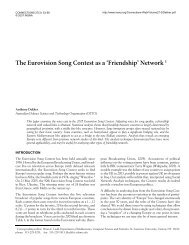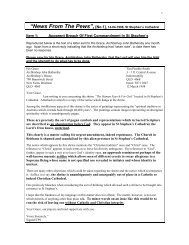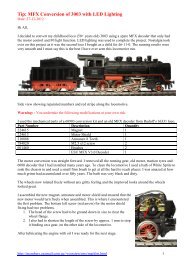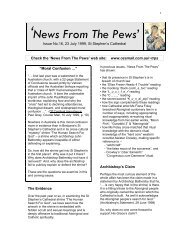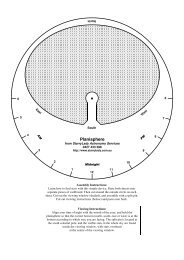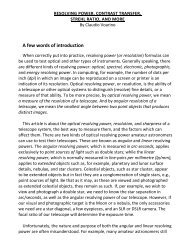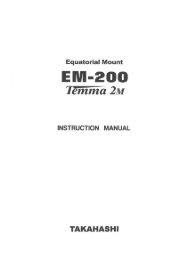Simple interest
Simple interest
Simple interest
You also want an ePaper? Increase the reach of your titles
YUMPU automatically turns print PDFs into web optimized ePapers that Google loves.
13<br />
<strong>Simple</strong> <strong>interest</strong><br />
VCEcoverage<br />
Area of study<br />
Units 3 & 4 • Business<br />
related<br />
mathematics<br />
In this cha<br />
chapter pter<br />
13A <strong>Simple</strong> <strong>interest</strong><br />
13B Finding P, r and T<br />
13C Bonds, debentures and<br />
term deposits<br />
13D Bank savings accounts<br />
13E Hire-purchase<br />
13F Effective rate of <strong>interest</strong>
608 Further Mathematics<br />
<strong>Simple</strong> <strong>interest</strong><br />
People often wish to buy goods and services that they cannot afford to pay for at the<br />
time, but which they are confident they can pay for over a period of time. The options<br />
open to these people include paying by credit card (usually at a very high <strong>interest</strong> rate),<br />
lay-by (where the goods are paid off over a period of time with no <strong>interest</strong> charged but<br />
no access to or use of the goods until the last payment is made), hire-purchase, or a<br />
loan from the bank.<br />
The last two options usually attract what is called simple <strong>interest</strong>. This is the amount of<br />
money charged by the financial institution for the use of its money. It is calculated as a<br />
percentage of the money borrowed multiplied by the number of periods (usually years)<br />
over which the money is borrowed.<br />
As an example, Monica wished to purchase a television for $550, but did not have<br />
the ready cash to pay for it. She made an agreement to borrow the money from a bank<br />
at 12% p.a. (per year) simple <strong>interest</strong> and pay it back over a period of 5 years. The<br />
amount of <strong>interest</strong> Monica would be charged on top of the $550 is<br />
$550 × 12% × 5 years which is $330.<br />
Therefore, Monica is really paying $550 + $330 = $880 for the television.
Chapter 13 <strong>Simple</strong> <strong>interest</strong> 609<br />
Total amount of loan or investment = Initial amount or Principal + Interest<br />
(charged or earned)<br />
A = P + I<br />
It would have been more economical for Monica to buy the television for cash at the<br />
time. However, by borrowing the money she has use of the television while she is<br />
paying it off. Also, by using this method she would be paying a small amount each<br />
month which is easy to budget for. The down-side is that she must pay the extra<br />
<strong>interest</strong>.<br />
<strong>Simple</strong> <strong>interest</strong> is the percentage of the amount borrowed or invested multiplied by<br />
the number of time periods (usually years). The amount is added to the principal either<br />
as payment for the use of the money borrowed or as return on money invested.<br />
I<br />
=<br />
PrT<br />
---------<br />
100<br />
I = <strong>Simple</strong> <strong>interest</strong> charged or earned ($)<br />
P = Principal (money invested or loaned) ($)<br />
r = Rate of <strong>interest</strong> per period (% per period)<br />
T = Time, the number of periods (years, months, days) over<br />
which the agreement operates<br />
Hint: The <strong>interest</strong> rate, r, and time period, T, must be stated and calculated in the same<br />
time terms, for example:<br />
1<br />
4% per annum for 18 months must be calculated over 1 -- years, as the <strong>interest</strong><br />
2<br />
rate period is stated in years (per annum);<br />
1% per month for 2 years must be calculated over 24 months, as the <strong>interest</strong> rate<br />
period is stated in months.<br />
Find the simple <strong>interest</strong> charged on borrowing $325 for 5 years at 3% p.a. (per annum or<br />
per year) <strong>interest</strong>.<br />
THINK WRITE<br />
1<br />
2<br />
3<br />
4<br />
5<br />
WORKED Example<br />
1<br />
Write the simple <strong>interest</strong> formula. I =<br />
List the values of P, r and T. Check that<br />
r and T are in the same time terms.<br />
PrT<br />
---------<br />
100<br />
P = $325<br />
r = 3% per year<br />
T = 5 years<br />
Substitute into the formula.<br />
325 × 3× 5<br />
I = --------------------------<br />
100<br />
Use a calculator to evaluate. I = 48.75<br />
Write your answer. The <strong>interest</strong> charged for borrowing $325 over<br />
5 years is $48.75.
610 Further Mathematics<br />
Graphics Calculator tip! <strong>Simple</strong> <strong>interest</strong> calculations<br />
1. Transpose the formula for simple <strong>interest</strong> so that it<br />
PrT<br />
equals zero. (0 = I – --------- ).<br />
100<br />
2. Press MATH , choose 0: Solver then press the up<br />
arrow key and enter the equation.<br />
3. Press ENTER , then enter the values of the known<br />
variables and move the cursor to the variable to be<br />
solved for. The given values for worked example 1<br />
are shown in the screen at right.<br />
4. Press ALPHA [SOLVE].<br />
Jan invested $210 with a building society in a fixed deposit account that paid 8% p.a.<br />
simple <strong>interest</strong> for 18 months. How much did she receive after the 18 months?<br />
THINK WRITE<br />
1<br />
2<br />
3<br />
4<br />
5<br />
6<br />
WORKED Example<br />
2<br />
Write the simple <strong>interest</strong> formula.<br />
PrT<br />
I = ---------<br />
100<br />
List the values of P, r and T. Check that P = $210<br />
r and T are in the same time terms. r = 8% p.a.<br />
Need to convert 18 months into years. T = 18 months<br />
1<br />
= 1 -- years<br />
Substitute into the formula.<br />
210 8 1<br />
I =<br />
Use a calculator to evaluate. I = $25.20<br />
Add the <strong>interest</strong> to the principal (total A = P + I<br />
amount received).<br />
A = $210 + $25.20<br />
Write your answer. Total amount received at the end of the<br />
investment is $235.20.<br />
1<br />
× × --<br />
2<br />
-----------------------------<br />
100<br />
2
WORKED<br />
Example<br />
1<br />
SkillSHEET 13.1<br />
SkillSHEET 13.2<br />
WORKED<br />
Example<br />
2<br />
remember<br />
remember<br />
Chapter 13 <strong>Simple</strong> <strong>interest</strong> 611<br />
1. <strong>Simple</strong> <strong>interest</strong> is the percentage of an amount borrowed or invested multiplied<br />
by the number of time periods, (usually years). The <strong>interest</strong> is added to the<br />
principal as payment for the use of the money or as return on the money<br />
invested.<br />
2. A = P + I where A = Total amount ($)<br />
P = Principal, or amount borrowed or invested ($)<br />
I = <strong>Simple</strong> <strong>interest</strong> charged or earned ($)<br />
PrT<br />
3. I = ---------<br />
100<br />
I = <strong>Simple</strong> <strong>interest</strong> charged or earned ($)<br />
P = Principal (money invested or loaned) ($)<br />
r = Rate of <strong>interest</strong> earned per period (% per period)<br />
T = Time, the number of periods over which the<br />
agreement operates<br />
4. Interest rate, r, and time, T, must be stated and calculated in the same time<br />
terms.<br />
13A<br />
<strong>Simple</strong> <strong>interest</strong><br />
1 Find the <strong>interest</strong> charged on the following amounts borrowed for the<br />
periods and at the rates given.<br />
a $680 for 4 years at 5% p.a. b $210 for 3 years at 9% p.a.<br />
c $415 for 5 years at 7% p.a. d $460 at 12% p.a. for 2 years<br />
e<br />
g<br />
1<br />
$1020 at 12 -- % p.a. for 2 years<br />
2<br />
1<br />
$821 at 7 -- % p.a. for 3 years<br />
4<br />
f<br />
h<br />
3<br />
$713 at 6 -- % p.a. for 7 years<br />
4<br />
11.25% p.a. on $65 for 6 years<br />
i 6.15% p.a. on $21.25 for 9 years j 9.21% p.a. on $623.46 for 4 years<br />
k<br />
3<br />
13 -- % p.a. on $791.35 for 5 years.<br />
4<br />
2 Find the <strong>interest</strong> charged or earned on the following loans and investments:<br />
a $690 loaned at 12% p.a. simple <strong>interest</strong> for 15 months<br />
b $7500 invested for 3 years at 1% per month simple <strong>interest</strong><br />
c $25 000 borrowed for 13 weeks at 0.1% per week simple <strong>interest</strong><br />
3<br />
1<br />
d $250 invested at 1 -- % per month for 2 -- years.<br />
4<br />
EXCEL Spreadsheet<br />
3 Find the amount to which each investment has grown after the investment periods<br />
shown in the following examples:<br />
a $300 invested at 10% p.a. simple <strong>interest</strong> for 24 months<br />
b $750 invested for 3 years at 1% per month simple <strong>interest</strong><br />
c $20 000 invested for 3 years and 6 months at 11% p.a. simple <strong>interest</strong><br />
3<br />
d $15 invested at 6 -- % p.a. for 2 years and 8 months<br />
4<br />
1<br />
e $10.20 invested at 8 --<br />
% p.a. for 208 weeks.<br />
2<br />
2<br />
Mathcad<br />
<strong>Simple</strong> <strong>interest</strong><br />
<strong>Simple</strong><br />
<strong>interest</strong><br />
GC program
612 Further Mathematics<br />
4<br />
5<br />
6<br />
7<br />
8<br />
9<br />
10<br />
multiple ultiple choice<br />
If John had $63 in his bank account and earned 9% p.a. over 3 years, the simple<br />
<strong>interest</strong> earned would be:<br />
A $5.67 B $1701 C $17.01 D $22.68 E $27.00<br />
multiple ultiple choice<br />
1<br />
If $720 was invested in a fixed deposit account earning 6 -- % p.a. for 5 years, the<br />
2<br />
<strong>interest</strong> earned at the end of 5 years would be:<br />
A $234.00 B $23 400.00 C $23.40 D $216.00 E $350.00<br />
multiple ultiple choice<br />
A 4-year bond paid 7.6% p.a. simple <strong>interest</strong>. If Sonja bought a bond worth $550, the<br />
<strong>interest</strong> she earned would be:<br />
A $16.72 B $167.20 C $717.20 D $1672 E $30.40<br />
multiple ultiple choice<br />
Bodgee Bank advertised a special offer. If a person invests $150 for 2 years, the bank<br />
will pay 12% p.a. simple <strong>interest</strong> on the money. At the expiry date, the investor would<br />
have earned:<br />
A $300 B $36 C $186 D $48 E $24<br />
multiple ultiple choice<br />
Maclay invested $160 in a bank for 6 years earning 8% simple <strong>interest</strong> each year. At<br />
the end of the 6 years, he will receive in total:<br />
A $928 B $236.80 C $76.80 D $768 E $208<br />
multiple ultiple choice<br />
1<br />
<strong>Simple</strong> <strong>interest</strong> was calculated on a term deposit of 4 years at 3 -- % per year. When<br />
2<br />
Ashleigh calculated the total return on her investment of $63.50, it was:<br />
A $72.39 B $7.75 C $71.24 D $8.89 E $75.50<br />
multiple ultiple choice<br />
Joanne asked Sally for a loan of $125 to buy new shoes. Sally agreed on the condition<br />
that Joanne paid it back in two years at 3% p.a. simple <strong>interest</strong>. The amount Joanne<br />
paid Sally at the end of the two years was:<br />
A $200 B $7.50 C $130.50 D $132.50 E $128.75
Chapter 13 <strong>Simple</strong> <strong>interest</strong> 613<br />
11 multiple ultiple choice<br />
Betty invests $550 in an investment account earning 4% p.a. simple <strong>interest</strong> over<br />
6 years. Ron puts his $550 in a similar investment earning 5% p.a. simple <strong>interest</strong> for<br />
5 years. The difference in their earnings at the end of the investment period is:<br />
A $55 B $5.50 C $7.50 D $0 E $595<br />
12 multiple ultiple choice<br />
Two banks pay simple <strong>interest</strong> on short-term deposits. Hales Bank pays 8% p.a. over<br />
5 years and Countrybank pays 10% p.a. for 4 years. The difference between the two<br />
banks’ final payout figure if $2000 was invested in each account is:<br />
A $0 B $800 C $2800 D $150 E $400<br />
13 Robyn wishes to purchase a new dress worth $350 to wear to the school formal. If she<br />
borrows the total amount from the bank and pays it off over 3 years at 11% p.a.<br />
simple <strong>interest</strong>, what is the total amount Robyn must pay back to the bank?<br />
1<br />
14 The Sharks Building Society offers loans at 8 -- % p.a. simple <strong>interest</strong> for a period of<br />
2<br />
18 months. Andrew borrows $200 from Sharks to buy Monique an engagement ring.<br />
Calculate the amount of <strong>interest</strong> Andrew is to pay over the 18 months.<br />
15 Silvio invested the $1500 he won in Lotto with an insurance company bond that pays<br />
1<br />
12 -- % p.a. simple <strong>interest</strong> provided he keeps the bond for 5 years. What is Silvio’s<br />
4<br />
total return from the bond at the end of the 5 years?<br />
16 The insurance company that Silvio used in the previous question allows people to withdraw<br />
part or all the money early. If this happens the insurance company will only pay<br />
3<br />
6 -- % p.a. simple <strong>interest</strong> on the amount which is withdrawn over the period it was invested<br />
4<br />
in the bond. The part which is left in the bond receives the original agreed <strong>interest</strong>. Silvio<br />
needed $700 for repairs to his car 2 years after he had invested the money but left the<br />
rest in for the full 5 years. How much <strong>interest</strong> did he earn from the bond in total?<br />
17 Jill and John decide to borrow money to improve their boat, but cannot<br />
agree which loan is the better value. They would like to borrow $2550.<br />
Jill goes to the Big-4 Bank and finds that they will lend her the money at<br />
1<br />
11 --<br />
% p.a. simple <strong>interest</strong> for 3 years. John finds that the Friendly<br />
3<br />
Building Society will lend the $2550 to them at 1% per month simple<br />
<strong>interest</strong> for the 3 years.<br />
a Which institution offers the best rates over the 3 years?<br />
b Explain why.
614 Further Mathematics<br />
Finding P, r and T<br />
In many cases we may wish to find the principal, <strong>interest</strong> rate or period of a loan.<br />
In these situations it is necessary to rearrange or transpose the simple <strong>interest</strong><br />
formula after (or before) substitution, as the following example illustrates.<br />
A bank offers 9% p.a. simple <strong>interest</strong> on an investment. At the end of 4 years the <strong>interest</strong><br />
earned was $215. How much was invested?<br />
THINK WRITE<br />
1 Write the simple <strong>interest</strong> formula.<br />
PrT<br />
I = ---------<br />
100<br />
2 List the values of I, r and T. Check that I = $215<br />
r and T are in the same time terms. r = 9% p.a.<br />
T = 4 years<br />
3 Substitute into the formula.<br />
P × r × T<br />
I = ---------------------<br />
100<br />
P × 9 × 4<br />
215 = ---------------------<br />
100<br />
4 Make P the subject by multiplying both<br />
sides by 100 and dividing both sides by<br />
(9 × 4).<br />
215 × 100<br />
P = -----------------------<br />
9 × 4<br />
5 Use a calculator to evaluate. P = 597.22<br />
Write your answer. The amount invested was $597.22.<br />
6<br />
WORKED Example<br />
3<br />
Transposed simple <strong>interest</strong> formula<br />
It may be easier to use the transposed formula when finding P, r or T.<br />
<strong>Simple</strong> <strong>interest</strong> formula transposes:<br />
to find the principal<br />
P =<br />
100 × I<br />
----------------r×<br />
T<br />
to find the <strong>interest</strong> rate<br />
r =<br />
100 × I<br />
-----------------<br />
P × T<br />
to find the period of the loan or investment T =<br />
100 × I<br />
-----------------<br />
P × r
Chapter 13 <strong>Simple</strong> <strong>interest</strong> 615<br />
When $720 is invested for 36 months it earns $205.20 simple <strong>interest</strong>. Find the yearly<br />
<strong>interest</strong> rate.<br />
THINK WRITE/DISPLAY<br />
1 Write the simple <strong>interest</strong> formula.<br />
100 × I<br />
r = ----------------<br />
P× T<br />
2 List the values of P, I and T. T must be P = $720<br />
expressed in years so that r can be I = $205.20<br />
evaluated in % per year.<br />
T = 36 months<br />
= 3 years<br />
3 Substitute into the formula.<br />
100 × 205.20<br />
r = -------------------------------<br />
720 × 3<br />
4 Evaluate on a calculator. Remember to<br />
bracket (720 × 3).<br />
5<br />
WORKED Example<br />
4<br />
Write your answer. The <strong>interest</strong> rate offered was 9.5% per annum.<br />
An amount of $255 was invested at 8.5% p.a. How long will it take, to the nearest year, to<br />
earn $86.70 in <strong>interest</strong>?<br />
THINK WRITE/DISPLAY<br />
1 Write the simple <strong>interest</strong> formula.<br />
100 × I<br />
T = ----------------<br />
P× r<br />
2 Substitute the values of P, I and r. The<br />
rate, r is expressed per annum so time, P = $255<br />
T, will be evaluated in the same time I = $86.70<br />
terms, namely years.<br />
r = 8.5% p.a.<br />
3 Substitute into the formula.<br />
100 × 86.70<br />
T = ----------------------------<br />
255 × 8.5<br />
4 Evaluate on a calculator. Remember to<br />
bracket (255 × 8.5).<br />
5<br />
WORKED Example<br />
5<br />
Write your answer. The period of the investment was 4 years.
SkillSHEET 13.3 WORKED<br />
Mathcad<br />
Finding<br />
P, r<br />
and T<br />
616 Further Mathematics<br />
Example<br />
3<br />
WORKED<br />
Example<br />
4<br />
WORKED<br />
Example<br />
5<br />
remember<br />
remember<br />
When finding P, r or T:<br />
1. substitute the given values into the formula and then rearrange to isolate the<br />
pronumeral, or<br />
2. transpose the simple <strong>interest</strong> formula<br />
100 × I<br />
(a) to find the principal<br />
P = ---------------r<br />
× T<br />
100 × I<br />
(b) to find the <strong>interest</strong> rate<br />
r = ----------------<br />
P× T<br />
100 × I<br />
(c) to find the period of the loan or investment T = ----------------<br />
P× r<br />
and substitute the given values into the transposed formula.<br />
13B<br />
Finding P, r and T<br />
1 For each of the following, find the principal invested.<br />
a <strong>Simple</strong> <strong>interest</strong> of 5% p.a., earning $307 <strong>interest</strong> over 2 years<br />
b <strong>Simple</strong> <strong>interest</strong> of 7% p.a., earning $1232 <strong>interest</strong> over 4 years<br />
c <strong>Simple</strong> <strong>interest</strong> of 8% p.a., earning $651 <strong>interest</strong> over 18 months<br />
1<br />
d <strong>Simple</strong> <strong>interest</strong> of 5 -- % p.a., earning $78 <strong>interest</strong> over 6 years<br />
2<br />
e <strong>Simple</strong> <strong>interest</strong> of 6.25% p.a., earning $625 <strong>interest</strong> over 4 years<br />
2 For each of the following, find the <strong>interest</strong> rate offered. Express rates in % per annum.<br />
a Loan of $10 000, with a $2000 <strong>interest</strong> charge, for 2 years<br />
b Investment of $5000, earning $1250 <strong>interest</strong> for 4 years<br />
c Loan of $150, with a $20 <strong>interest</strong> charge, for 2 months<br />
d Investment of $1400 earning $178.50 <strong>interest</strong> for 6 years<br />
1<br />
e Investment of $6250 earning $525 <strong>interest</strong> for 2 -- years<br />
3 For each of the following, find the period of time (to the nearest month) for which the<br />
principal was invested or borrowed.<br />
a Investment of $1000 at simple <strong>interest</strong> of 5% p.a. earning $50<br />
b Loan of $6000 at simple <strong>interest</strong> of 7% p.a. with an <strong>interest</strong> charge of $630<br />
c Loan of $100 at simple <strong>interest</strong> of 24% p.a. with an <strong>interest</strong> charge of $6<br />
1<br />
d Investment of $23 000 at simple <strong>interest</strong> of 6 -- % p.a. earning $10 465<br />
2<br />
e Loan of $1 500 000 at simple <strong>interest</strong> of 0.125% per month earning $1875<br />
4 Lennie Cavan earned $576 in <strong>interest</strong> when she invested in a fund paying 9.5% simple<br />
<strong>interest</strong> for 4 years. How much did Lennie invest originally?<br />
5 Lennie’s sister Lisa also earned $576 <strong>interest</strong> at 9% simple <strong>interest</strong>, but she only had<br />
to invest it for 3 years. What was Lisa’s initial investment?<br />
6 Jack Kahn put some money away for 5 years in a bank account which paid 3 --<br />
%<br />
4<br />
<strong>interest</strong>. He found from his bank statement that he had earned $66. How much did<br />
Jack invest?<br />
2<br />
3
Chapter 13 <strong>Simple</strong> <strong>interest</strong> 617<br />
7 James needed to earn $225 in one year. He invested $2500 in an account earning<br />
simple <strong>interest</strong> at a rate of 4.5% p.a. paid monthly. How many months will it take<br />
James to achieve his aim?<br />
8 Carol has $3000 to invest. Her aim is to earn $450 in <strong>interest</strong> at a rate of 5% p.a. Over<br />
what term would she invest?<br />
9<br />
10<br />
11<br />
12<br />
13<br />
multiple ultiple choice<br />
Peter borrowed $5000 and intended to pay it back in 3 years. The terms of the loan<br />
3<br />
indicated Peter was to pay 9 -- % p.a. <strong>interest</strong>. The <strong>interest</strong> Peter paid on the loan was:<br />
4<br />
A $146 250 B $446.25 C $1462.50 D $121.88 E $1211.88<br />
multiple ultiple choice<br />
Joanne’s accountant found that<br />
for the past 2 years she had<br />
earned a total of $420 <strong>interest</strong> in<br />
an account paying 6% simple<br />
<strong>interest</strong>. When she calculated<br />
how much she invested the<br />
amount was:<br />
A $350<br />
B $3500<br />
C $50.40<br />
D $7000<br />
E $70.00<br />
multiple ultiple choice<br />
A loan of $1000 is taken over 5 years. The simple <strong>interest</strong> is calculated monthly. The<br />
total amount repaid for this loan is $1800. The simple <strong>interest</strong> rate per year on this<br />
loan is closest to:<br />
A 8.9% B 16% C 36% D 5% E 11.1%<br />
multiple ultiple choice<br />
Jarrod decides to buy a motorbike at no deposit and no repayments for 3 years. He<br />
takes out a loan of $12 800 and is charged at 7.5% p.a. simple <strong>interest</strong> over the<br />
3 years. The lump sum Jarrod has to pay in 3 years time is:<br />
A $960 B $13 760 C $2880 D $12 800 E $15 680<br />
multiple ultiple choice<br />
1<br />
Chris and Jane each take out loans of $4500 and are offered 6 -- % p.a. simple <strong>interest</strong><br />
4<br />
over a 3-year period. Chris’s <strong>interest</strong> is paid monthly whereas Jane’s is paid yearly.<br />
The difference in the total amount of <strong>interest</strong> each person pays after the 3 years is:<br />
A none B $877.50 C $10 530 D $9652.50 E $1000<br />
14 Alisha has $8900 that she is able to invest. She has a goal of earning at least $1100 in<br />
2 years or less. Do any of the following investments satisfy Alisha’s goal?<br />
a 10% p.a. for 15 months<br />
1<br />
b 4 --<br />
% p.a. earning $1200<br />
4<br />
c After 100 weeks a final payout of $10 500<br />
d After 2 years at 0.6% per month
618 Further Mathematics<br />
Bonds, debentures and term deposits<br />
Debentures<br />
If a company needs money, one option is for it to offer a debenture (a legal document<br />
detailing an investment agreement) for sale to the public. An investor will pay an<br />
amount of money (principal) to the company, and in return the company agrees to pay<br />
the investor <strong>interest</strong> at regular intervals (monthly, quarterly or yearly). At the end of the<br />
agreed term the principal is returned to the investor. The advantage of the debenture is<br />
two-fold: first, the company has the use of the money during the agreed period to make<br />
more money for the company and second, the investor knows what their return will be<br />
for each period and is guaranteed the return of the principal.<br />
Term deposits<br />
TOP INVESTOR RATES<br />
1 to 5 yr effective rates are shown in brackets. Source: CANNEX (Polifax 019 725 660).<br />
BEST BANK TERM DEPOSITS BEST OTHERS<br />
Period Bank<br />
Rate<br />
Period Institution Rate<br />
30 days HSBC<br />
4.70<br />
30 days GIO<br />
3.95<br />
90 days Arab Bank 5.00<br />
90 days GIO<br />
4.75<br />
180 days HSBC<br />
5.12<br />
180 days GIO<br />
4.95<br />
270 days Arab Bank 5.25<br />
270 days Greater BS/HC CU 5.00<br />
1 year Suncorp Metway 5.00 (5.58) 1 year GIO<br />
5.25<br />
2 years HSBC/PIBA 5.66/5.70 (5.78) 2 years GIO<br />
5.49<br />
3 years HSBC<br />
6.20 (6.20) 3 years AGC<br />
5.70<br />
4 years HSBC<br />
6.16 (6.30) 4 years Police CU 6.00<br />
5 years HSBC<br />
6.33 (6.48) 5 years AGC<br />
6.20<br />
Term deposits allow an investor to lend money to a bank or building society for a<br />
particular length of time. The money cannot be withdrawn during the agreed period but<br />
earns a better <strong>interest</strong> rate than in a normal savings account. At the end of the term the<br />
<strong>interest</strong> plus the principal is paid back to the investor. The advantage of the term deposit<br />
is that the money is secure and the <strong>interest</strong> rate is better than that on a savings account.<br />
The disadvantage, of course, is that if the money is needed during the period it cannot<br />
be withdrawn (except under special circumstances agreed to by the bank).<br />
Investment bonds<br />
Investment bonds are another form of investment which is offered to the investor by a<br />
bank or the government, and <strong>interest</strong> is paid on the investment monthly, quarterly, six<br />
monthly or annually. The one advantage is that the bond can be sold to someone else<br />
during the period before the maturation date. This allows the investor some flexibility if<br />
the money is needed during the period of investment.<br />
All the above investment types offer advantages to the investor and to the institution.<br />
The institution has the use of the money over a fixed period and the investor receives<br />
higher than normal <strong>interest</strong>. All of these investments carry some risk and individuals<br />
must decide on which type to use based on personal circumstances.<br />
Bonds, debentures and term deposits are simple <strong>interest</strong> accounts.<br />
(5.35)<br />
(5.60)<br />
(5.82)<br />
(6.09)<br />
(6.34)
WORKED Example<br />
Chapter 13 <strong>Simple</strong> <strong>interest</strong> 619<br />
Jaclyn buys $50 000 worth of debentures in a company. She earns 9.5% p.a. simple<br />
<strong>interest</strong>, paid to her quarterly (that is, every 3 months). If the agreed period of the<br />
debenture was 18 months:<br />
a calculate the amount of <strong>interest</strong> Jaclyn will earn for each quarter<br />
b calculate the total amount collected at the end of the term.<br />
THINK WRITE<br />
a 1 Write the simple <strong>interest</strong> formula.<br />
PrT<br />
a I = ---------<br />
100<br />
2 List the values of P, r and T. Convert P = $50 000<br />
the <strong>interest</strong> rate period to quarters. r = 9.5% per year<br />
= 9.5% ÷ 4 per quarter<br />
= 2.375% per quarter<br />
T = 1 quarter<br />
3 Substitute into the formula and<br />
evaluate.<br />
50 000 × 2.375 × 1<br />
I = --------------------------------------------<br />
100<br />
= 1187.50<br />
4 Write your answer. Jaclyn will earn $1187.50 for each quarter.<br />
b 1 There are 6 quarters in 18 months. b Total <strong>interest</strong> = $1187.50 × 6<br />
Alternatively, use the simple <strong>interest</strong><br />
= $7125<br />
formula with the new data.<br />
or<br />
50 000 × 2.375 × 6<br />
I = --------------------------------------------<br />
100<br />
= 7125<br />
Write your answer. The total <strong>interest</strong> earned is $7125.<br />
2<br />
6<br />
Townbank offers a term deposit account paying investors 12.5% p.a. simple <strong>interest</strong> on<br />
investments over $100 000 for 2 years or more. Peta decides to invest $150 000 in this<br />
account for 2 years. How much <strong>interest</strong> will Peta earn at the end of the investment?<br />
THINK WRITE<br />
1<br />
2<br />
WORKED Example<br />
7<br />
Write the simple <strong>interest</strong> formula. I =<br />
List the values of P, r and T. Check that<br />
r and T are described in the same time<br />
terms.<br />
Substitute into the formula and<br />
evaluate.<br />
PrT<br />
---------<br />
100<br />
P = $150 000<br />
r = 12.5% p.a.<br />
T = 2 years<br />
3 150 000 × 12.5 × 2<br />
I = --------------------------------------------<br />
100<br />
= $37 500<br />
4 Write your answer. Peta’s $150 000 invested for 2 years will<br />
earn $37 500.
Mathcad<br />
EXCEL Spreadsheet<br />
GC program<br />
<strong>Simple</strong><br />
<strong>interest</strong><br />
<strong>Simple</strong><br />
<strong>interest</strong><br />
<strong>Simple</strong><br />
<strong>interest</strong><br />
620 Further Mathematics<br />
An investment bond is offered to the public at 9% p.a. Louise buys a bond worth $2000<br />
that will mature in 2 years. How much in total will Louise receive at the end of the 2 years?<br />
THINK WRITE<br />
1<br />
2<br />
3<br />
4<br />
5<br />
6<br />
WORKED<br />
Example<br />
6<br />
WORKED<br />
Example<br />
7<br />
WORKED<br />
Example<br />
8<br />
WORKED Example<br />
8<br />
Write the simple <strong>interest</strong> formula.<br />
PrT<br />
I = ---------<br />
100<br />
List the values of P, r and T. P = $2000<br />
r = 9% p.a.<br />
T = 2 years<br />
Substitute into the formula.<br />
2000 × 9 × 2<br />
I = -----------------------------<br />
100<br />
Use a calculator to evaluate. I = $360<br />
Add <strong>interest</strong> to principal. A = P + I<br />
A = 2000 + 360<br />
= 2360<br />
Write your answer. The $2000 investment bond will mature at the<br />
end of 2 years to a total of $2360 at simple<br />
<strong>interest</strong> of 9% p.a.<br />
remember<br />
remember<br />
1. <strong>Simple</strong> <strong>interest</strong> accounts include bonds, debentures and term deposits.<br />
2. Read the question carefully: does it ask for the <strong>interest</strong> or the final total<br />
amount?<br />
13C<br />
Bonds, debentures and<br />
term deposits<br />
1 Spice Clothing company offers debentures paying 8% p.a. <strong>interest</strong> paid quarterly for a<br />
period of 2 years. When $20 000 worth of Spice debentures are purchased, calculate<br />
the total return on the investment.<br />
2 Harry decided to invest $2000 in a term deposit for 18 months. The bank offered<br />
10.5% p.a. <strong>interest</strong> paid each half-year. Calculate the <strong>interest</strong> Harry would earn on the<br />
investment.<br />
3 An investment bond is advertised as paying 10 --<br />
% p.a. <strong>interest</strong> on a 3-year invest-<br />
2<br />
ment. Elise purchased a bond for $3000, but needed to sell it after 18 months. How<br />
much will Elise receive at the end of her 18-month investment?<br />
4 Rabbit debentures, worth $10 000, were purchased for a period of 15 months. The<br />
debenture paid 12% p.a., payable each 3 months. What was the investment worth at<br />
the end of the 15 months?<br />
1
Chapter 13 <strong>Simple</strong> <strong>interest</strong> 621<br />
5 JNK Bank offers term deposits on amounts above $5000 at 12% p.a. simple <strong>interest</strong><br />
payable each quarter for periods longer than 2 years. Mr Smith invests $6000 in this<br />
1<br />
term deposit for 2 -- years. What is Mr Smith’s final return on his money?<br />
6 Mark purchases a $2500 investment bond earning 12 -- % p.a. <strong>interest</strong> paid yearly.<br />
4<br />
The bond matures after 2 years.<br />
What <strong>interest</strong> will Mark earn?<br />
7<br />
8<br />
9<br />
10<br />
11<br />
2<br />
multiple ultiple choice<br />
Debentures in TRADEX are issued at 9% p.a. simple <strong>interest</strong>. The <strong>interest</strong> gained on<br />
an investment of $7000 over 3 years would be:<br />
A $630 B $1890 C $18 900 D $7630 E $21 000<br />
multiple ultiple choice<br />
The rate of <strong>interest</strong> on a term deposit for 3 months is 4.25% per year. If $10 000 is<br />
invested in the term deposit, the amount of <strong>interest</strong> earned over the 3 months is:<br />
A $106.25 B $425 C $141.67 D $1062.50 E $1275<br />
multiple ultiple choice<br />
1<br />
State government bonds pay <strong>interest</strong> of 7 -- % p.a. simple <strong>interest</strong>. Philippa invested<br />
4<br />
$2500 in the bonds which mature in 5 years. Philippa’s income each quarter would be:<br />
A $181.25 B $2718.77 C $45.31 D $725 E $72.50<br />
multiple ultiple choice<br />
1<br />
ElCorp offers company debentures earning 8 -- % p.a. <strong>interest</strong> for an investment of<br />
2<br />
$5000 for 2 years. The <strong>interest</strong> on the investment is:<br />
A $170 B $212.50 C $825 D $850 E $85<br />
multiple ultiple choice<br />
A term deposit is advertised stating that if $2500 is invested for 2 years the <strong>interest</strong><br />
earned is $285. The rate of <strong>interest</strong> per annum is:<br />
A 10% B 17.5% C 5.7% D 11.4% E 10.5%<br />
1
WorkSHEET13.1<br />
622 Further Mathematics<br />
12<br />
13<br />
multiple ultiple choice<br />
An investment bond of $7500 pays <strong>interest</strong> of $1125 at 3.75% p.a. <strong>interest</strong>. The time<br />
the bond is taken for is:<br />
1<br />
1<br />
A 3 years B 4 -- years C 3 -- years D 4 years E 5 years<br />
2<br />
multiple ultiple choice<br />
A principal amount is invested in a bond that will accumulate to a total of $64 365<br />
1<br />
after 4 months at 6 -- % p.a. The principal is:<br />
2<br />
A $60 000 B $63 000 C $6300 D $50 000 E $5000<br />
14 The following term deposit rates were advertised in a magazine<br />
Toni Ford had $5500 to invest. Calculate her<br />
return if she invested the money in a term<br />
deposit with this bank for:<br />
a 35 days<br />
b 120 days<br />
c 1 year.<br />
Hint: Express days as a fraction of a year.<br />
Term Rate<br />
30–59 days 4.2% p.a.<br />
60–149 days 4.7% p.a.<br />
150–269 days 5.0% p.a.<br />
270–365 days 5.4% p.a.<br />
15 Dennis and Delia have $7500 to invest. They know that they will need the money in<br />
18 months but are not sure how to invest it. While reading a magazine, they see the<br />
following three advertisements:<br />
1<br />
i investment bonds offered at 12 -- % p.a. <strong>interest</strong> paid each 6 months<br />
2<br />
ii debentures in a company paying 12% p.a. with <strong>interest</strong> paid each quarter<br />
3<br />
iii a term deposit paying 11 -- % p.a. <strong>interest</strong> paid each 3 months.<br />
4<br />
a Calculate their total return on each investment.<br />
b What did you notice about the time in which the <strong>interest</strong> was calculated?<br />
2
Bank savings accounts<br />
Most banks offer their customers savings accounts with<br />
<strong>interest</strong> that is usually paid on<br />
1. the minimum monthly balance, or<br />
2. the daily balance.<br />
The <strong>interest</strong> is added at a specified time — say once or<br />
twice a year — as nominated by the bank, for example,<br />
on the first day of June and December of each year. The<br />
more frequently the <strong>interest</strong> is added, the better for the<br />
customers.<br />
Chapter 13 <strong>Simple</strong> <strong>interest</strong> 623<br />
Savings accounts — minimum monthly balances<br />
To calculate <strong>interest</strong> on a minimum monthly balance saving account, the bank looks at<br />
the balances of the account for each month and calculates the <strong>interest</strong> on the smallest<br />
balance that appears in each month.<br />
WORKED Example<br />
9<br />
At the beginning of March, Ryan had $621 in his savings bank account. On 10 March he<br />
deposited $60. If the bank pays 8% p.a. <strong>interest</strong> paid monthly and calculated on the<br />
minimum monthly balance, calculate the <strong>interest</strong> Ryan earns in March.<br />
THINK WRITE<br />
1 The smallest balance for March is<br />
$621, as the only other transaction in<br />
that month increased the balance.<br />
Minimum monthly balance for March is $621.<br />
2 Write the simple <strong>interest</strong> formula.<br />
PrT<br />
I = ---------<br />
100<br />
3 List the values of P, with r and T in P = $621<br />
months.<br />
8<br />
r = ----- % per month<br />
12<br />
T = 1 month<br />
4 Substitute into the formula and<br />
evaluate.<br />
8<br />
621 × ----- × 1 12<br />
I = ----------------------------<br />
100<br />
= 4.14<br />
5 Write your answer. The <strong>interest</strong> earned for the month of March<br />
was $4.14.
624 Further Mathematics<br />
The minimum monthly balance method is used in the next worked example.<br />
Minimum monthly balance method<br />
Date Deposit Withdrawal Balance<br />
3/7<br />
7/7<br />
21/7<br />
28/7<br />
$100<br />
$500<br />
$ 50<br />
$678<br />
$337.50<br />
$837.50<br />
$159.50<br />
$209.50<br />
The above passbook page shows the transactions for July. Find the <strong>interest</strong> that will be<br />
earned in July if the bank pays 7% p.a. simple <strong>interest</strong> on the minimum monthly balance.<br />
THINK WRITE<br />
1<br />
2<br />
3<br />
To find the smallest balance for July,<br />
look at all the running balances. Also<br />
check balances at the start and end of<br />
the month. Notice that the balance on<br />
1 and 2 July, if shown, would have been<br />
$237.50.<br />
Write the simple <strong>interest</strong> formula. I =<br />
List the values of P, r and T in months. P = $159.50<br />
7<br />
r = ----- % per month<br />
12<br />
T = 1 month<br />
Substitute into the formula and<br />
7<br />
× ----- × 1 12<br />
evaluate. I = -----------------------------------<br />
100<br />
= 0.93<br />
Minimum monthly balance for July is $159.50.<br />
PrT<br />
---------<br />
100<br />
4 159.50<br />
5<br />
WORKED Example<br />
10<br />
Write your answer. The <strong>interest</strong> earned for July was $0.93.<br />
Savings accounts — daily balances<br />
To calculate the <strong>interest</strong> on a daily balance saving account, the bank looks at the<br />
balances of the account. The number of days each balance is maintained is used to<br />
calculate the <strong>interest</strong>. When doing these calculations for yourself, you need to set out<br />
your workings carefully, for example using tables.<br />
Let’s investigate worked example 10 again, using the daily balance method.
Chapter 13 <strong>Simple</strong> <strong>interest</strong> 625<br />
Daily balance method<br />
Use the daily balance method to find the <strong>interest</strong> that will be earned in July, if the bank<br />
pays 7% p.a. simple <strong>interest</strong> on the daily balance.<br />
THINK WRITE<br />
1<br />
2<br />
3<br />
4<br />
5<br />
WORKED Example<br />
Set up a table showing each new<br />
balance and the number of days<br />
the balance applies. Look at all<br />
running balances including those<br />
for 1 and 31 July.<br />
Calculate the <strong>interest</strong> for each<br />
balance. As the <strong>interest</strong> rate is in %<br />
per annum, express the number of<br />
days as a fraction of a year; for<br />
2<br />
example, 2 days = -------- of a year.<br />
Sum the <strong>interest</strong>. The calculations<br />
were to hundredths of a cent for<br />
accuracy.<br />
365<br />
11<br />
Balance<br />
$<br />
Number<br />
of days<br />
the<br />
balance<br />
applies<br />
Interest for month = $2.9734<br />
<strong>Simple</strong> <strong>interest</strong><br />
calculations<br />
$<br />
Round off to the nearest cent. $2.9734 ≈ $2.97<br />
Write your answer. The <strong>interest</strong> earned for July was $2.97.<br />
Interest<br />
earned<br />
$<br />
237.50 × 7 × --------<br />
$237.50 2 365<br />
------------------------------------- $0.0911<br />
100<br />
337.50 × 7 × --------<br />
$337.50 4 365<br />
------------------------------------- $0.2589<br />
100<br />
837.50 × 7 × --------<br />
$837.50 14 365<br />
------------------------------------- $2.2486<br />
100<br />
159.50 × 7 × --------<br />
$159.50 7 365<br />
------------------------------------- $0.2141<br />
100<br />
209.50 × 7 × --------<br />
$209.50 4 365<br />
------------------------------------- $0.1607<br />
100<br />
The daily balance method offers more <strong>interest</strong> than the minimum monthly<br />
balance method, as it credits the customer for all monies in the account, including<br />
the $600 deposited for 14 days.<br />
remember<br />
remember<br />
1. Two methods used by banks for calculating <strong>interest</strong> on savings accounts are:<br />
(a) minimum monthly balances<br />
(b) daily balances.<br />
2. Daily balances offer the best <strong>interest</strong> rate for investors.<br />
3. Look at the balances on the first and last day of the month when establishing<br />
the minimum monthly balance or daily balances.<br />
1<br />
4. Express days as a fraction of a year; for example, 1 day = -------- of a year.<br />
365<br />
2<br />
4<br />
14<br />
7<br />
4
GC program<br />
EXCEL Spreadsheet<br />
<strong>Simple</strong><br />
<strong>interest</strong><br />
626 Further Mathematics<br />
WORKED<br />
Example<br />
9<br />
Mathcad<br />
<strong>Simple</strong> <strong>interest</strong><br />
Example<br />
10<br />
SkillSHEET 13.4 WORKED<br />
WORKED<br />
Example<br />
11<br />
Bank savings accounts<br />
1 A bank savings passbook showed that the opening balance for the month was $2150.<br />
That month Paul paid the following bills out of the account:<br />
Electricity $21.60 Telephone $10.30 Rent $52.00<br />
Paul also deposited his wage of $620 for the month into the account.<br />
a What was Paul’s minimum monthly balance?<br />
b If the bank pays 5.5% p.a. paid monthly on the minimum monthly balance, how<br />
much <strong>interest</strong> did Paul earn in the month?<br />
2 Date Deposit Withdrawal Balance<br />
1/5<br />
3/5<br />
7/5<br />
19/5<br />
27/5<br />
13D<br />
$12<br />
$10<br />
$16<br />
$ 8<br />
$27.50<br />
$39.50<br />
$23.50<br />
$15.50<br />
$25.50<br />
Roberta’s passbook shows the above transactions for May. Find the <strong>interest</strong> Roberta<br />
will earn in May if the bank pays 6% p.a. simple <strong>interest</strong>:<br />
a on the minimum monthly balance<br />
b on the daily balance.<br />
3 For the month of July, Rhonda received $3.20 in <strong>interest</strong> on her savings account.<br />
Rhonda’s minimum balance in July was $426.20. What was the per annum simple<br />
<strong>interest</strong> rate offered by the bank?<br />
4 Kristen receives the following statement from her bank. Due to a computer error the<br />
<strong>interest</strong> and balances were not calculated.<br />
Kristen rang the bank and was told that she received <strong>interest</strong> at a rate of 6 --<br />
% p.a. paid<br />
monthly on her minimum monthly balance. Copy out Kristen’s statement and fill in the<br />
balances and <strong>interest</strong> payments.<br />
1998 Transaction Debit Credit Balance<br />
1 May Balance B/F 2132.20<br />
3 May Cheq 4217 460.27<br />
7 May Deposit 230.16<br />
17 May Cheq 4218 891.20<br />
26 May Wages 1740.60<br />
31 May Interest _______<br />
2 June Deposit 415.10<br />
8 June Cheq 4220 2217.00<br />
19 June Cheq 4219 428.50<br />
21 June Cheq 4222 16.80<br />
23 June Wages 1740.60<br />
30 June Interest _______<br />
1 July Deposit 22.80<br />
4 July Cheq 4221 36.72<br />
18 July Cheq 4223 280.96<br />
26 July Wages 1740.60<br />
31 July Interest _______<br />
3<br />
4
c<br />
Chapter 13 <strong>Simple</strong> <strong>interest</strong> 627<br />
5 Using the bank statement from question 4, another bank offers to show Kristen that<br />
daily balance <strong>interest</strong> credited each quarter is more rewarding. The <strong>interest</strong> is still<br />
6.75% p.a. but is only credited at the end of the quarter, that is, on 31 July. Calculate:<br />
a the <strong>interest</strong> for the quarter ending July<br />
b the increase in <strong>interest</strong> earned using the daily balance method.<br />
Hint: This could be done using a spreadsheet. See the section on Spreadsheet Applications<br />
later in this chapter.<br />
6 Clark Kent has the following income and expenses for August and September.<br />
Income: $1410.20 salary each fortnight beginning 4 August<br />
$461.27 income tax refund on 5 September<br />
$68.20 cheque from health fund on 10 August<br />
Expenses: $620.80 rent on 20 August and 20 September<br />
$180.64 telephone account on 2 September<br />
$150.26 electricity account on 15 August<br />
$180.00 Visa account on 30 August<br />
$327.60 health fund on 5 August and 5 September<br />
Draw up a statement (as for question 4) for Clark, remembering that he receives<br />
1<br />
7 -- % <strong>interest</strong> paid on the last day of each month on the minimum monthly balance in<br />
2<br />
the account.<br />
1<br />
7 If the savings <strong>interest</strong> rate is 2 --<br />
% p.a., calculate the <strong>interest</strong> credited at the end of each<br />
2<br />
quarter for the following accounts using:<br />
i the minimum monthly balance<br />
ii the daily balance.<br />
Also calculate:<br />
iii the increase in <strong>interest</strong> earned using the daily rather than the minimum monthly<br />
balance method.<br />
a 3rd quarter statement for July, August and September<br />
Date Deposit Withdrawal Balance<br />
3/7<br />
$100 $ 750.00<br />
7/8<br />
$ 500<br />
$ 1250.00<br />
21/8<br />
$ 670<br />
$ 1920.00<br />
28/8<br />
$420 $ 1500.00<br />
20/9<br />
$10 000<br />
$11 500.00<br />
b 1st quarter statement for January, February and March in 2000<br />
Date Deposit Withdrawal Balance<br />
31/12/1999 $100<br />
$400.00<br />
1/2/2000<br />
$600<br />
?<br />
1/3/2000<br />
$100<br />
?<br />
28/3/2000<br />
$ 50<br />
?<br />
Date Deposit Withdrawal Balance<br />
3/10<br />
17/12<br />
21/12<br />
22/12<br />
28/12<br />
$2100<br />
$3500<br />
$1900<br />
$400<br />
$650<br />
$2450.00<br />
$5950.00<br />
$4050.00<br />
$3650.00<br />
$3000.00
628 Further Mathematics<br />
Hire-purchase<br />
People buy on hire-purchase when they cannot afford to buy the goods for cash.<br />
A deposit is usually paid and the balance is paid over a fixed period of time. The<br />
retailer arranges a contract with a financial institution and the purchaser pays<br />
regular instalments including <strong>interest</strong> at a flat rate to the financial institution.<br />
A flat rate is the same as simple <strong>interest</strong> rate.<br />
The <strong>interest</strong> charged is added onto the balance owing and then divided into the equal<br />
instalments.<br />
Advantages of this form of buying are:<br />
1. the purchaser has the use of the goods while paying them off<br />
2. the cost of the goods is spread over a long term in small amounts.<br />
The disadvantages are more complex:<br />
1. the purchaser pays more for the goods in the long run<br />
2. the goods are legally owned by the finance company until they are fully paid off<br />
3. any forfeit on making the regular payments entitles the finance company to repossess<br />
the goods as well as retain all past payments made.<br />
The main stages of hire-purchase <strong>interest</strong> and total price calculations are:<br />
Step 1. Check the price of the goods.<br />
Step 2. Pay any deposit.<br />
Step 3. Set up the balance as a loan.<br />
Loan amount = price of goods − deposit<br />
Step 4. Calculate the <strong>interest</strong> on the loan using the simple <strong>interest</strong> formula.<br />
Step 5. The total amount to be repaid is the sum of the balance and the <strong>interest</strong>.<br />
Step 6. Establish regular payments/instalments.<br />
total amount<br />
Instalment amount = ---------------------------------------------------number<br />
of instalments<br />
Step 7. Total cost of goods = deposit + loan amount + <strong>interest</strong><br />
or = deposit + instalment amount × number of instalments
A sapphire ring with a marked price of $1800<br />
is offered to the purchaser on the following<br />
terms: $200 deposit and the balance to be<br />
paid over 24 equal monthly instalments with<br />
<strong>interest</strong> charged at 11.5% p.a. flat rate. Find:<br />
a the total <strong>interest</strong> paid<br />
b the monthly repayments.<br />
Chapter 13 <strong>Simple</strong> <strong>interest</strong> 629<br />
THINK WRITE<br />
a 1 Write the cash price. a Cash price = $1800<br />
2 Determine the deposit. Deposit = $200<br />
3 Calculate the amount of the loan Balance or loan amount = cash price − deposit<br />
required.<br />
= $1800 − $200<br />
= $1600<br />
4 List P, r and T. P = $1600<br />
r = 11.5% p.a.<br />
T = 2 years<br />
5 Write the simple <strong>interest</strong> formula,<br />
substitute into it and evaluate.<br />
PrT<br />
I = ---------<br />
100<br />
1600 × 11.5 × 2<br />
I = -------------------------------------<br />
100<br />
I = $368<br />
6 Write your answer. Total <strong>interest</strong> to be paid is $368.<br />
b 1 Add the <strong>interest</strong> to the principal. b Total repayment amount = $1600 + $368<br />
= $1968<br />
2 Calculate the monthly repayments.<br />
total amount<br />
Regular payment = ----------------------------------------------------number<br />
of repayments<br />
$1968<br />
= --------------<br />
24<br />
= $82<br />
3<br />
WORKED Example<br />
12<br />
Write your answer. The regular monthly repayments are $82.
630 Further Mathematics<br />
WORKED Example<br />
A car is purchased on hire-purchase. The cash price is $21 000 and the terms are a deposit<br />
of 10% of the price, then the balance to be paid off over 60 equal monthly instalments.<br />
Interest is charged at 12% p.a.<br />
a What is the monthly instalment? b What is the total cost of the car?<br />
THINK WRITE<br />
a 1 Write the cash price. a Cash price = $21 000<br />
2 Calculate the deposit, that is, 10% of Deposit = 10% × $21 000<br />
$21 000.<br />
= $2100<br />
3 Calculate the amount of the loan Loan amount = $21 000 − $2100<br />
required.<br />
= $18 900<br />
4 List P, r, and T. Check that r and T P = $18 900<br />
are in the same time terms. Convert r = 12% p.a.<br />
the time period into years to match T = 60 months<br />
the % rate per annum.<br />
= 5 years<br />
5 Write the simple <strong>interest</strong> formula,<br />
substitute into it and evaluate.<br />
PrT<br />
I = ---------<br />
100<br />
18 900 × 12 × 5<br />
I = ------------------------------------<br />
100<br />
I = 11 340<br />
6 Add the <strong>interest</strong> to the principal to find Total amount = 18 900 + 11 340<br />
the total amount of the loan to be repaid.<br />
= $30 240<br />
7 Calculate the monthly instalment.<br />
total amount<br />
Regular payment = ----------------------------------------------------number<br />
of repayments<br />
$30 240<br />
= ------------------<br />
60<br />
= $504<br />
8 Write your answer. The monthly instalment is $504.<br />
b 1 Calculate the cost of the car. b Total cost = deposit + instalment amount<br />
× number of instalments<br />
= 2100 + 504 × 60<br />
= $32 340<br />
or<br />
Total cost = deposit + loan + <strong>interest</strong><br />
= 2100 + 18 900 + 11 340<br />
= $32 340<br />
Write your answer. The total cost of the car is $32 340.<br />
2<br />
13<br />
Weekly instalment advertising<br />
Many retailers use the option of hire-purchase to attract new sales. They also choose to<br />
advertise the instalment amount as it can seem to be very manageable. Buyers should<br />
investigate the entire arrangement offered and find answers to questions such as:<br />
1. What is the <strong>interest</strong> rate?<br />
2. How does it compare to bank rates?<br />
3. What is the total cost of the item?<br />
4. How much <strong>interest</strong> is charged?
WORKED Example<br />
14<br />
The following advertisement for a computer was found<br />
in a newspaper.<br />
Computer for sale<br />
Cash price $3695<br />
or pay only a third deposit and<br />
104 weekly instalments of only $25.97.<br />
If there is a total of 104 weekly instalments and a third<br />
deposit, find:<br />
a the <strong>interest</strong> charged<br />
b the <strong>interest</strong> rate<br />
c the total cost of the computer.<br />
Chapter 13 <strong>Simple</strong> <strong>interest</strong> 631<br />
THINK WRITE<br />
a 1 Write the cash price. a Cash price = $3695<br />
2 Calculate the deposit.<br />
1<br />
Deposit = -- of $3695<br />
3<br />
= $1231.67<br />
3 Calculate the amount of the loan. Loan amount = $3695.00 − $1231.67<br />
= $2463.33<br />
4 Calculate the total cost of the loan, that Total cost of loan = $25.97 × 104<br />
is, the total of the loan and the <strong>interest</strong><br />
charged paid by weekly instalments.<br />
= $2700.88<br />
5 Calculate the <strong>interest</strong> charged and Interest charged = total amount − loan<br />
write your answer.<br />
I = A − P<br />
= 2700.88 − 2463.33<br />
= 237.55<br />
Interest on the $2463.33 loan is $237.55<br />
b 1 Use the transposed simple <strong>interest</strong> b P = $2463.33<br />
formula to find r, the <strong>interest</strong> rate on I = $237.55<br />
the loan. Check that T is expressed T = 104 weeks<br />
in years to evaluate the <strong>interest</strong> rate = 2 years<br />
in % per annum.<br />
100 × I<br />
r = ----------------<br />
P× T<br />
100 × 237.55<br />
r = -------------------------------<br />
2463.33 × 2<br />
= 4.82 . . .<br />
2 Write your answer. The <strong>interest</strong> rate for this hire-purchase is<br />
4.8% p.a.<br />
c 1 Calculate the total cost of the c Total cost = deposit + loan + <strong>interest</strong><br />
computer.<br />
= 1231.67 + 2463.33 + 237.55<br />
= $3932.55<br />
2 Write your answer. The total cost for the computer including<br />
<strong>interest</strong> on the loan is $3932.55.
632 Further Mathematics<br />
WORKED<br />
Example<br />
12<br />
WORKED<br />
Example<br />
13<br />
WORKED<br />
Example<br />
14<br />
remember<br />
remember<br />
The main stages of <strong>interest</strong> and total price calculations are:<br />
1. Loan amount = price of goods − deposit<br />
2. Flat rate <strong>interest</strong> on the loan is calculated using the simple <strong>interest</strong> formula.<br />
total amount<br />
3. Instalment amount = --------------------------------------------------number<br />
of instalments<br />
4. Total cost of goods = deposit + loan amount + <strong>interest</strong><br />
or = deposit + instalment amount × number of instalments<br />
13E<br />
Hire-purchase<br />
1 Debbie and Peter purchased a lounge suite on hire-purchase. The cash price was<br />
$2500. Peter and Debbie paid $250 deposit and signed an agreement to pay the<br />
balance in 36 equal monthly instalments. If the hire-purchase company charges 14%<br />
p.a. simple <strong>interest</strong>, find:<br />
a the total <strong>interest</strong> paid<br />
b the monthly repayments.<br />
2 When buying new appliances for a recently renovated kitchen, Cheryl bought, from<br />
the same supplier, a refrigerator worth $490, a stove worth $350 and a dishwasher<br />
worth $890. If she paid $450 deposit and paid the balance over 48 months in equal<br />
monthly instalments at 12% p.a. simple <strong>interest</strong>, find:<br />
a Cheryl’s monthly instalments<br />
b the total amount Cheryl paid for the goods.<br />
3 While on holidays in Noosa, Jan saw a bracelet she could not live without. The<br />
marked price was $2000. The jewellery shop owner offered her a discount of 15% if<br />
she paid a deposit of $250. Jan paid the deposit and signed a hire-purchase agreement<br />
that she would pay the balance of the bracelet’s cost at 15% p.a. flat rate with 24 equal<br />
monthly instalments.<br />
a What was the price of the bracelet after the 15% discount?<br />
b Calculate the balance Jan was to pay back.<br />
c Calculate the <strong>interest</strong> Jan paid.<br />
d Calculate Jan’s monthly instalment.<br />
e How much did Jan pay altogether for the bracelet?<br />
4 The cash price of a suit is $1800. If a customer pays a deposit of $300 and pays equal<br />
monthly instalments of $60 over 2 --<br />
years, calculate:<br />
1<br />
2<br />
a the amount of <strong>interest</strong> charged<br />
b the flat rate of <strong>interest</strong><br />
c the total paid for the suit.<br />
5 A car has a marked price of $7500. The dealer gives two choices of payment:<br />
i no deposit, with the $7500 paid in equal monthly instalments of $250 for 3 years<br />
ii $1500 deposit, paying <strong>interest</strong> of 12% p.a. and making equal monthly repayments<br />
for 3 years.<br />
a Calculate the <strong>interest</strong> rate in choice i.<br />
b Which deal is best for the purchaser? Why?
Chapter 13 <strong>Simple</strong> <strong>interest</strong> 633<br />
6 multiple ultiple choice<br />
An electric guitar is bought on hire-purchase for a $250 deposit<br />
and monthly instalments of $78.50 for 3 years. The cash price<br />
for this guitar is $2500. The <strong>interest</strong> rate is closest to:<br />
A 9.5% B 7% C 8.5% D 8% E 7.5%<br />
7 multiple ultiple choice<br />
‘Carpeting the home is not cheap’, Rob stated.<br />
‘Hire-purchase is the answer’, replied Tom.<br />
The cost of the carpet for the house is $9500. Rob and Tom<br />
place a deposit of $1500 and plan to pay it back weekly over<br />
4 years at 13% <strong>interest</strong> per year. The weekly instalment is:<br />
A $253.37 B $62.20 C $46.20 D $58.46 E $462.00<br />
8 multiple ultiple choice<br />
A salesman told a couple that if they bought a television at $890 today, he would<br />
allow a deposit of $100 plus $8.65 weekly for 2 years. The <strong>interest</strong> rate charged is:<br />
A 10% B 7% C 6.5%<br />
1<br />
D 9 -- %<br />
2<br />
E 7.5%<br />
9 For the video camera in the advertisement, find:<br />
i the total paid<br />
ii the <strong>interest</strong> rate for both Option a and Option b.<br />
THIS VIIDEOO CAAMERA CAN BE YOURS.<br />
EEASY TEERMS<br />
CASH PRICE $780<br />
or OOption a<br />
NO DEPOSIT AAND $37.7700<br />
MONTHLLY PAYMEENTTSS<br />
FOR 2 YEARRS<br />
or Option b<br />
$100 DEPOSIITT AAND $$26.72<br />
PAID MONTHHLY FOR 3300 MONTHS<br />
10 A company advertised a dining room suite for $2500. You could pay:<br />
a cash and receive a 10% discount, or<br />
b $200 deposit and 5% p.a. <strong>interest</strong> on the remainder for 3 years, or<br />
c $300 deposit and 4.5% p.a. on the remainder for 3 --<br />
years, or<br />
d $400 deposit and 4% p.a. <strong>interest</strong> on the remainder for 4 years.<br />
What is the total paid on each deal?<br />
11 Carefully read the advertisement at right for<br />
the cash price and regular instalments for the<br />
colour television. The term of the repayments<br />
is for 3 years with 20% deposit.<br />
Calculate:<br />
a the flat <strong>interest</strong> rate<br />
b the total cost of the TV under the hirepurchase<br />
plan<br />
c the increase in cost over a cash sale.<br />
1<br />
2<br />
$1095 or $15.40 fortnightly
634 Further Mathematics<br />
Effective rate of <strong>interest</strong><br />
When purchasing goods on hire-purchase or through a personal loan, the finance<br />
company lending the money hopes to make the deal look as attractive as possible.<br />
Some details, therefore, are not prominently stated to the customer. One such detail<br />
is the effective rate of <strong>interest</strong>. The amount borrowed reduces over the term of the<br />
loan, but the customer is still paying <strong>interest</strong> on the total initial loan amount. The<br />
effective <strong>interest</strong> rate is the equivalent reducing balance <strong>interest</strong> rate taken over the<br />
contract period.<br />
There are two ways of converting flat rate to effective rate.<br />
1. Estimation<br />
Effective <strong>interest</strong> rate is a little less than 2 × flat <strong>interest</strong> rate.<br />
2. Calculation<br />
2n<br />
Effective <strong>interest</strong> rate = ----------- × flat rate where n is the number of payments.<br />
n + 1<br />
That is, on a loan of $100 at 10% <strong>interest</strong> over 4 years with yearly repayments, the<br />
<strong>interest</strong> charged is:<br />
I = 100 × 0.10 × 4 = $40.<br />
2× 4<br />
The effective <strong>interest</strong> rate is -----------<br />
× 10% = 16% (assuming yearly repayment).<br />
4+ 1<br />
This means that, even though the person is paying $40 <strong>interest</strong>, the effective <strong>interest</strong><br />
rate over the period is actually 16%, not 10%. The longer the period of the loan, the<br />
higher the effective <strong>interest</strong> rate. This is shown clearly in the following table.<br />
Year<br />
Principal<br />
owing<br />
$10,000<br />
PERSONAL LOAN<br />
Repayment<br />
of principal<br />
$149<br />
from per fortnight<br />
Based on a 3 year term at a fixed rate of 9.95%* p.a.<br />
Flat rate of<br />
<strong>interest</strong> paid<br />
Total <strong>interest</strong> $40 Flat rate 10% Effective rate 16%<br />
Effective rate of<br />
<strong>interest</strong> paid<br />
1 100 25 10% of 100 = 10 16% of 100 = 16<br />
2 75 25 10% of 100 = 10 16% of 75 = 12<br />
3 50 25 10% of 100 = 10 16% of 50 = 8<br />
4 25 25 10% of 100 = 10 16% of 25 = 4<br />
$100 $40 $40
Chapter 13 <strong>Simple</strong> <strong>interest</strong> 635<br />
Jason decides to borrow money for a holiday. If a personal loan is taken over 4 years with<br />
equal quarterly repayments at 12% p.a. flat rate (simple <strong>interest</strong>), calculate the effective<br />
rate of <strong>interest</strong>.<br />
THINK WRITE<br />
1<br />
2<br />
3<br />
4<br />
WORKED Example<br />
15<br />
Write the flat rate and number of<br />
instalments.<br />
Flat rate = 12%<br />
n = 4 × 4<br />
= 16<br />
Write the formula for effective rate of<br />
<strong>interest</strong>.<br />
2n<br />
Effective rate = ----------- × flat rate<br />
n + 1<br />
Substitute n = 16 and r = 12.<br />
2× 16<br />
Effective rate = -------------- × 12<br />
16 + 1<br />
Write your answer. Check the answer<br />
by estimating the rate which is less than<br />
2 × 12% (or 24%) p.a.<br />
remember<br />
remember<br />
= 22.588<br />
The effective <strong>interest</strong> rate is 22.6% p.a. for a flat<br />
rate loan of 12% with sixteen instalments.<br />
1. The effective <strong>interest</strong> rate is a true indication of the <strong>interest</strong> rate on a loan that<br />
is calculated using a flat <strong>interest</strong> rate when the loan is progressively being<br />
reduced, such as in hire-purchases.<br />
2. Estimation of effective <strong>interest</strong>:<br />
Effective <strong>interest</strong> rate is a little less than 2 × flat interst rate.<br />
Calculation of effective <strong>interest</strong>:<br />
2n<br />
Effective <strong>interest</strong> rate = ----------- × flat rate where n is the number of payments.<br />
n + 1<br />
3. The fewer the payments, the closer the flat rate is to being a true indication of<br />
the rate charged.<br />
For example, 12% flat rate with 1 payment only:<br />
2× 1<br />
Effective rate = ----------- × 12% = 12%<br />
1+ 1
EXCEL Spreadsheet<br />
636 Further Mathematics<br />
WORKED<br />
Example<br />
15<br />
Mathcad<br />
Effective rate of <strong>interest</strong><br />
Effective rate of <strong>interest</strong><br />
1 William is to purchase a new video recorder. If William pays $125 monthly instalments<br />
over 3 years at an <strong>interest</strong> rate of 11.5% p.a. simple <strong>interest</strong>, what effective <strong>interest</strong> rate<br />
is he paying?<br />
2<br />
Item<br />
13F<br />
Cash<br />
price<br />
$<br />
Deposit<br />
$<br />
Monthly<br />
instalment<br />
$<br />
For each of the items in the above table, calculate:<br />
i the total amount of <strong>interest</strong> charged on each item<br />
ii the total amount paid over the period given for each item<br />
iii the monthly instalment on each item<br />
iv the effective <strong>interest</strong> rate.<br />
Interest<br />
rate<br />
Term of<br />
loan<br />
a Television $875 $150 8% p.a. 2 years<br />
b New car $23 990 $2000 10% p.a. 5 years<br />
c Clothing $550 $100 7.5% p.a. 1 year<br />
d Refrigerator $1020 $50 6 --<br />
% p.a. 18 months<br />
e Tools $250 $75 9% p.a. 15 months<br />
3 The cash price for a car is $4600. If the car is purchased on time payments the cost will<br />
be $5200. A deposit of $100 is required and the agreement is that the car will be fully<br />
paid for in 3 years, paid in equal monthly instalments. Find:<br />
a the monthly instalment<br />
b the simple (flat) <strong>interest</strong> rate per year<br />
c the effective <strong>interest</strong> rate.<br />
4 A camera valued at $1200 is purchased using a hire-purchase agreement. A deposit of<br />
$200 is required and equal monthly instalments of $75 are paid over the 18-month<br />
agreed period. Calculate:<br />
a the flat (simple) <strong>interest</strong> rate per annum<br />
b the effective <strong>interest</strong> rate.<br />
5 The bank approves a personal loan of $5000. A flat <strong>interest</strong> rate of 12.5% p.a. is<br />
charged, with repayments to be made over a 9-month period in equal weekly instalments.<br />
Calculate:<br />
a the weekly instalment<br />
b the effective <strong>interest</strong> rate.<br />
6 Calculate the effective <strong>interest</strong> rate on a loan of $1000 if the monthly repayments are<br />
$60 and the loan is to be repaid over 2 years. (Hint: First calculate the simple<br />
<strong>interest</strong> rate.)<br />
3<br />
4
Chapter 13 <strong>Simple</strong> <strong>interest</strong> 637<br />
7 Carefully read the advertisement (including the small print) for the purchase of the<br />
refrigerator below and calculate:<br />
a the flat <strong>interest</strong> rate<br />
b the effective <strong>interest</strong> rate<br />
c the total cost under the hire-purchase plan<br />
d the increase in cost over a cash sale.<br />
$599<br />
or<br />
$4.21<br />
weekly<br />
(one third deposit<br />
over two years)<br />
8 Copy and complete the following table.<br />
Cash<br />
price Deposit<br />
Instalment<br />
(monthly) Period<br />
<strong>Simple</strong><br />
<strong>interest</strong><br />
rate<br />
$2500 $500 2 years 10% p.a.<br />
$150 $50 6 months 9.5% p.a.<br />
$685 $75 9 months 6 --<br />
% p.a.<br />
$128 $ nil $11.20 1 year<br />
$6500 $500 $325 2 years<br />
Effective<br />
<strong>interest</strong><br />
rate<br />
$10 000 $1500 5 years 10% p.a.<br />
3<br />
4<br />
WorkSHEET13.2
EXCEL Spreadsheet<br />
EXCEL Spreadsheet<br />
<strong>Simple</strong><br />
<strong>interest</strong><br />
Effective<br />
rate of<br />
<strong>interest</strong><br />
638 Further Mathematics<br />
Spreadsheet applications<br />
Accountants, financial planners, banks and other financial institutions use spreadsheets<br />
to record and perform calculations. Many calculation tasks are similar in nature and<br />
tedious; therefore, once a spreadsheet is set up, some of these tasks can be done more<br />
quickly and easily. Another advantage of the use of a spreadsheet is solving the ‘what<br />
if’ question. This function allows the numbers entered on the spreadsheet to be changed<br />
and an answer to be calculated to predict what would happen in a particular scenario.<br />
This is particularly useful when looking at factors such as how much a person can<br />
borrow and pay back, changes in terms, and changes in <strong>interest</strong> rates.<br />
Your Maths Quest CD contains the Excel files ‘<strong>Simple</strong> <strong>interest</strong>’ and ‘Effective rate of<br />
<strong>interest</strong>’. These may be used to investigate various scenarios by typing new values in<br />
the yellow cells or by modifying the spreadsheet in some way. A screen shot of the file<br />
‘<strong>Simple</strong> Interest’ is shown below.<br />
Which is the best deal?<br />
1 Find three advertisements that offer products on hire purchase.<br />
2 Investigate each offer by calculating:<br />
a the total amount of <strong>interest</strong> to be paid<br />
b the total amount to be paid over the term of the loan<br />
c the monthly repayment<br />
d the effective <strong>interest</strong> rate.<br />
3 Compare this with other methods of financing the purchase of the product.<br />
4 Write a brief report on the advantages and disadvantages of each method.
summary<br />
Chapter 13 <strong>Simple</strong> <strong>interest</strong> 639<br />
<strong>Simple</strong> <strong>interest</strong> formula<br />
• A = P + I where A = Total amount ($)<br />
P = Principal or amount borrowed or invested ($)<br />
PrT<br />
• I = ---------<br />
100<br />
I = <strong>Simple</strong> <strong>interest</strong> charged or earned ($)<br />
I = <strong>Simple</strong> <strong>interest</strong> charged or earned ($)<br />
P = Principal (money invested or loaned) ($)<br />
r = Rate of <strong>interest</strong> earned per period (% per period)<br />
T = Time, the number of periods over which the agreement operates<br />
• Interest rate, r, and time period, T, must be stated and calculated in the same time terms.<br />
Finding P, r and T<br />
• To find the principal<br />
100 × I<br />
P = ---------------r<br />
× T<br />
• To find the <strong>interest</strong> rate<br />
100 × I<br />
r = ----------------<br />
P× T<br />
• To find the period of the loan or investment<br />
Bonds, debentures and term deposits<br />
100 × I<br />
T = ----------------<br />
P× r<br />
• Term investments with governments are called bonds.<br />
• Term investments with companies are called debentures.<br />
• Term investments with banks are called term deposits.<br />
• All three are investments for a fixed period of time offering a simple <strong>interest</strong> rate.<br />
Savings banks — minimum monthly and daily balances<br />
• Two methods used by banks for calculating <strong>interest</strong> on savings accounts are:<br />
1. minimum monthly balances 2. daily balances.<br />
• Daily balances offer the best <strong>interest</strong> rate for investors.<br />
• Look at the balances on the first and last day of the month when establishing the<br />
minimum monthly balance or daily balances.<br />
1<br />
• Express days as a fraction of a year; for example, 1 day = -------- of a year.<br />
Hire-purchase<br />
• Hire-purchase is a loan for goods with <strong>interest</strong> calculated using flat rate (simple)<br />
<strong>interest</strong> and regular payments.<br />
• The main stages of calculations are:<br />
1. Loan amount = price of goods − deposit<br />
2. Flat rate <strong>interest</strong> on the loan is calculated using the simple <strong>interest</strong> formula.<br />
total amount<br />
Instalment amount = ---------------------------------------------------number<br />
of instalments<br />
Total cost of goods = deposit + loan amount + <strong>interest</strong> or<br />
= deposit + instalment amount × number of instalments<br />
Effective rates of <strong>interest</strong><br />
• The effective <strong>interest</strong> rate is a true indication of the <strong>interest</strong> rate on a loan. It is<br />
calculated using a flat <strong>interest</strong> rate when the loan is progressively being reduced,<br />
such as in hire-purchases.<br />
1. Estimation:<br />
Effective <strong>interest</strong> rate is a little less than 2 × flat <strong>interest</strong> rate<br />
2. Calculation:<br />
2n<br />
Effective <strong>interest</strong> rate = -----------<br />
× flat rate where n is the number of payments.<br />
n + 1<br />
365
640 Further Mathematics<br />
CHAPTER review<br />
Multiple choice<br />
13A 1<br />
13A<br />
13A<br />
13B<br />
1 Two banks pay simple <strong>interest</strong> on short-term deposits. Bank A pays 6% p.a. over 4 years and<br />
Bank B pays 6.5% p.a. for 3 -- years. The difference between the two banks’ final payout<br />
2<br />
figure if $5000 was invested in each account is:<br />
A $0 B $1200 C $1137.50 D $150 E $62.50<br />
2 Clayton invested $360 in a bank for 3 years at 8% simple <strong>interest</strong> each year. At the end of<br />
the 3 years, the total amount he will receive is:<br />
A $86.40 B $236.80 C $28.80 D $388.80 E $446.40<br />
3 Philip borrowed $7000 and intended to pay it back in 4 years. The terms of the loan<br />
indicated Philip was to pay 9% p.a. <strong>interest</strong>. The <strong>interest</strong> Philip paid on the loan was:<br />
A $25 200 B $630 C $7630 D $9520 E $2520<br />
4 A loan of $5000 is taken over 5 years. The simple <strong>interest</strong> is calculated monthly. The<br />
<strong>interest</strong> bill on this loan is $1125. The simple <strong>interest</strong> rate per year on this loan is:<br />
1<br />
A 3% B 4 -- % C 3.75% D 5% E 3.5%<br />
13B, C 1<br />
13B<br />
13C<br />
13C<br />
13C<br />
2<br />
5 The principal invested in an investment bond that will accumulate $2015 after 6 months<br />
invested at 6 -- % p.a. is:<br />
2<br />
A $60 000 B $62 000 C $6200 D $50 000 E $5000<br />
6 A loan of $10 000 is taken over 10 years. The total <strong>interest</strong> bill on this loan is $2000. The<br />
simple <strong>interest</strong> rate per year on this loan is:<br />
1<br />
A 3% B 4 -- % C 2% D 5% E 2.5%<br />
1<br />
2<br />
2<br />
7 A 6-year bond pays 8 -- % p.a. simple <strong>interest</strong>. If Rhonda buys a bond worth $500, the<br />
<strong>interest</strong> she would earn would be:<br />
A $250 B $255 C $2550 D $233.75 E $230<br />
8 <strong>Simple</strong> <strong>interest</strong> was calculated on a term deposit of 5 years at 3 -- % p.a. When Leigh<br />
calculated her total return on her investment principal of $350, her return was:<br />
A $415.63 B $400 C $65.63 D $131.25 E $481.25<br />
3<br />
4<br />
9 State government bonds pay <strong>interest</strong> of 7 --<br />
% p.a. simple <strong>interest</strong>. Jess invested $3500 in the<br />
bonds which mature in 5 years. Jess’s income each quarter would be:<br />
A $113.00 B $1356.25 C $3567.81 D $67.81 E $82.50<br />
3<br />
4
10 In the bank statement shown below the minimum balance for the month is:<br />
Chapter 13 <strong>Simple</strong> <strong>interest</strong> 641<br />
Date Transaction Deposit Withdrawal Balance<br />
5/4 Transfer from CBR $100<br />
$456.50<br />
7/4 Salary<br />
$1500<br />
$1956.50<br />
9/4 Cheque — 23456<br />
$1380 $576.50<br />
23/4 ATM — Rowville<br />
$125 $451.50<br />
A $456.50 B $1956.50 C $576.50 D $451.50 E $356.50<br />
11 A pearl necklace is purchased on hire-purchase for $225 deposit with equal monthly<br />
payments of $80 for 2 years. The cash price is $2000. The <strong>interest</strong> rate is:<br />
A 3.5% B 6% C 4% D 8% E 7.5%<br />
12 A hire-purchase contract specifies that there are to be monthly payments for 2 years. The<br />
flat rate of <strong>interest</strong> is 6.3% p.a. The effective <strong>interest</strong> rate for this contract is closest to:<br />
A 12.1% B 11.6% C 8.4% D 6.3% E 12.6%<br />
Short answer<br />
1 Cynthia invested $270 with a building society in a fixed deposit account that paid 8% p.a.<br />
simple <strong>interest</strong> for 4 years. How much did Cynthia receive at the end of the 4 years?<br />
2 A bank offers 8.5% p.a. simple <strong>interest</strong> on an investment. At the end of 3 years the <strong>interest</strong><br />
earned was $765. How much was invested?<br />
3 If $725 is invested for 3 years and earns $206.65 <strong>interest</strong>, calculate the yearly <strong>interest</strong> rate.<br />
1<br />
4 Jack put some money away for 4 -- years in a bank account which is paying 3 -- % p.a.<br />
2<br />
4<br />
<strong>interest</strong>. He found on his bank statement he had earned $67.50. How much did Jack invest?<br />
5 Jacob needed to earn $225 in one year. He invested $2000 in an account earning simple<br />
<strong>interest</strong> at a rate of 4.5% p.a. paid monthly. How many months will it take Jacob to achieve<br />
his aim?<br />
3<br />
13D<br />
13E<br />
13F<br />
13A<br />
13B<br />
13B<br />
13B<br />
13B
13C<br />
13C<br />
13C<br />
642 Further Mathematics<br />
6 Steve invested the $1800 he won at the races in an insurance company bond that pays 12 -- %<br />
2<br />
p.a. provided he keeps the bond for 4 years. What is Steve’s total return from the bond at the<br />
end of the 4 years?<br />
7 Jocelyn buys $3500 worth of debentures in a company. She earns 8.5% p.a. simple <strong>interest</strong><br />
paid to her quarterly. If the agreed period of the debenture was 28 months, calculate the<br />
amount of <strong>interest</strong> Jocelyn will earn.<br />
8 The bank offers a term deposit account paying investors 10.5% p.a. on investments over<br />
$10 000 for 2 years. Paul decides to invest $12 000 in this account. How much <strong>interest</strong> will<br />
he earn at the end of the investment?<br />
13C 1<br />
13D<br />
13D<br />
9 An investment bond is offered to the public at 10% per year. Louis buys a bond worth $4000<br />
1<br />
that will mature in 2 -- years. How much in total will Louis receive at the end of the 2 -- years?<br />
10 At the beginning of July, Ross had $580 in his savings bank account. On 15 July he<br />
withdrew $80. If the bank pays 8% p.a. <strong>interest</strong> paid monthly, calculate the <strong>interest</strong> Ross<br />
earns in July:<br />
a if calculated on the minimum monthly balance<br />
b if calculated on the daily balance.<br />
11<br />
Date Deposit Withdrawal Balance<br />
1/5<br />
3/5<br />
7/5<br />
19/5<br />
27/5<br />
2<br />
$12<br />
$6<br />
$28.80<br />
Deborah’s passbook shows the above transactions for May. Calculate the <strong>interest</strong> Deborah<br />
3<br />
will earn in May if the bank pays 4 --<br />
% p.a. simple <strong>interest</strong> monthly:<br />
4<br />
a on the minimum monthly balance<br />
b on the daily balance.<br />
$10<br />
2<br />
$302.20<br />
$273.40<br />
1
12 The cash price of a car is $18 000.<br />
If a customer pays a deposit of $3000<br />
and pays equal monthly instalments<br />
of $300 over 5 years, calculate:<br />
a the amount of <strong>interest</strong> charged<br />
b the flat rate of <strong>interest</strong><br />
c the total paid for the car<br />
d the effective <strong>interest</strong> rate.<br />
Chapter 13 <strong>Simple</strong> <strong>interest</strong> 643<br />
13 The cash price for a bicycle is $460. If the bike is purchased on time payments the total cost<br />
will be $550. A deposit of $50 is required and the agreement is that the bike will be fully<br />
paid for in 2 years, in equal monthly instalments. Find:<br />
a the monthly instalment<br />
(round up to the nearest cent)<br />
b the simple <strong>interest</strong> rate per year<br />
(to 1 decimal place)<br />
c the effective <strong>interest</strong> rate<br />
(to 1 decimal place).<br />
13E, F<br />
13E, F
test<br />
yourself<br />
ourself<br />
CHAPTER<br />
13<br />
644 Further Mathematics<br />
Analysis<br />
1<br />
Date Description Debit Credit Balance<br />
4 August<br />
8 August<br />
19 August<br />
27 August<br />
28 August<br />
ATM<br />
Deposit<br />
EFTPOS<br />
Salary<br />
ATM<br />
100.00<br />
119.50<br />
1527.40<br />
325.60<br />
975.60<br />
2383.50<br />
1983.50<br />
a Complete the missing credits, debits and balances in the shaded areas of the above account.<br />
b The bank is offering 2.4% p.a. on the minimum monthly balance. What is the <strong>interest</strong> rate<br />
per month?<br />
c Calculate the <strong>interest</strong> that was earned for the month of August.<br />
2 Geoff wants to buy a windsurfer. Its retail price is $3995. Geoff’s first option for financing the<br />
purchase is using hire-purchase. The terms offered by Your Money Finance Company is<br />
10% deposit with fortnightly instalments over 2 years at an <strong>interest</strong> rate of 7.8% per annum.<br />
a How much will Geoff need to withdraw from his savings account to pay the deposit?<br />
b Calculate the fortnightly repayments and total <strong>interest</strong> charge.<br />
c What is the total cost of the windsurfer?<br />
d A personal loan is advertised at 13.5% per annum. For Geoff to compare the <strong>interest</strong> rate<br />
he needs to convert the hire-purchase flat rate of <strong>interest</strong> to the effective <strong>interest</strong> rate.<br />
Calculate the effective <strong>interest</strong> rate.<br />
3 Another option is for Geoff to save up until he has the cash to pay for the windsurfer. He can<br />
place the balance of his savings account (shown above in question 1) into a term deposit<br />
offering 5.6% per annum for a 2-year term.<br />
a Calculate the total value of his investment at the end of 2 years.<br />
b Geoff uses the term deposit investment towards the purchase of the windsurfer. What extra<br />
fortnightly savings will be needed over the next 2 years to make up the balance of $3995?<br />
c What is the main attraction of the hire-purchase option over the options in 3a and b?


